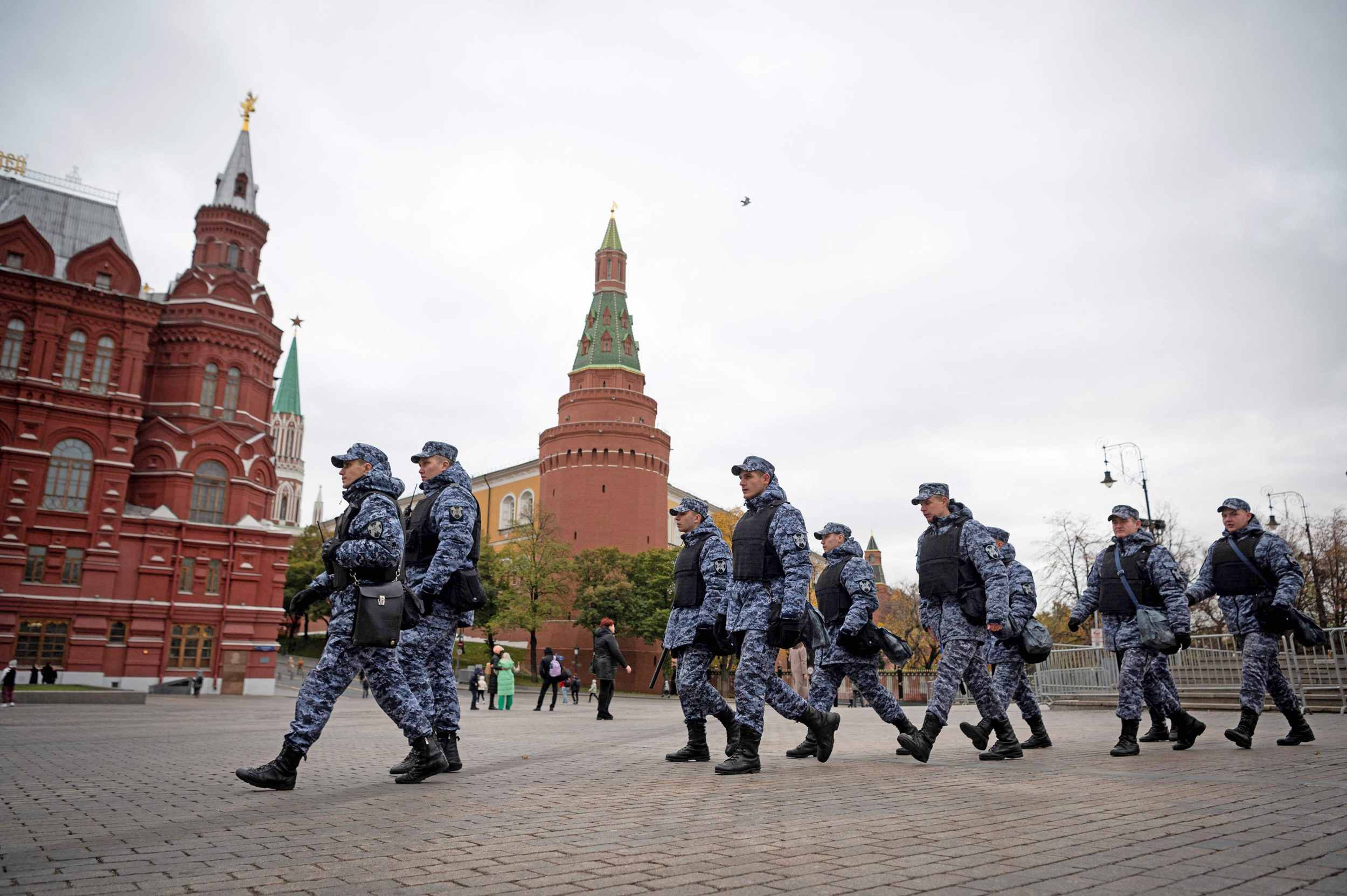–
10:58 AM 10/31/2017
What Congress Should Ask Tech Executives About Russia
Russia Tried To Infiltrate Trump Campaign, Mueller Documents …
TRUMP-RUSSIA
Charges against Trump’s former campaign chairman Paul Manafort and campaign advisers Rick Gates and George Papadopoulos were announced by special counsel Robert Mueller yesterday, the charges were made as part of Muller’s investigation into Russian interference in the 2016 U.S. presidential election. Manafort and Gates surrendered to the F.B.I. yesterday and Papadopoulos secretly pleaded guilty to lying to the F.B.I. weeks ago and has been cooperating with investigators for months. Matt Apuzzo, Adam Goldman, Michael S. Schmidt and Matthew Rosenberg report at the New York Times.
Papadopoulos’s plea describes extensive efforts to establish links between the Trump campaign and Russian officials, in a January 2017 interview with the F.B.I. Papadopoulos said that a London-based professor claimed he had “dirt” on Hillary Clinton, including “thousands of emails.” Rosalind S. Helderman and Tom Hamburger report at the Washington Post, revealing how much Trump campaign officials knew about Papadopoulos’s attempts to broker relationships.
Papadopoulos’s guilty plea is a “small part” of a “large-scale ongoing investigation,” a spokesperson for Mueller’s office, Aaron Zelinsky, said yesterday, Katelyn Polantz reporting at CNN.
The charges against former Trump campaign officials “has nothing to do with the president,” the White House press secretary Sarah Huckabee Sanders said yesterday in a daily briefing, adding that the indictments do not change the fact there has been no evidence of Trump-Russia collusion and played down Papadopoulos’s role in the campaign. Jordan Fabian reports at the Hill.
The indictments demonstrate the wide scope of the Mueller investigation, the charges against Manafort and Gates relate to tax and money-laundering while they were working in Ukraine, and the Papadopoulos guilty plea shows that Mueller has the ability to “flip” people without it being leaked. Joe Palazzalo and Jacob Gershman report at the Wall Street Journal.
Republican senators said yesterday that legislation protecting Mueller is not necessary because they do not believe Trump would fire the special counsel, Jordain Carney reports at the Hill.
The prominent Washington lobbyist Tony Podesta has stepped down from his lobbying group as Mueller’s team investigate his connections to Manafort, a source familiar with the matter said yesterday. Mark Honseball and Ginger Gibson report at Reuters.
Trump was “seething” when he found out about the indictments, according to a Republican source close to the White House and the President hit out at the Mueller investigation in a series of tweets yesterday. Jeff Zeleny and Kevin Liptak report at CNN.
Republicans have tried to avoid discussing the Mueller indictments and sought to distance themselves when probed, Karoun Demirjian and Sean Sullivan report at the Washington Post.
The indictments could upset the congressional investigations into Russia’s interference in the 2016 election, neither of the intelligence committees have met with Papadopoulos and it is unclear whether Manafort and Gates can engage with Congress. Elana Schor, Kyle Cheney and Ali Watkins report at POLITICO.
Who is George Papadopoulos? Alex Johnson explains at NBC News.
The key questions raised by Papadopoulos’s cooperation with the F.B.I. and what we know already are set out by Aaron Blake at the Washington Post.
The campaign officials described in the Papadopoulos plea are explained by Rosalind S. Helderman at the Washington Post.
The unexpected Papadopoulos guilty plea may have significant implications as it relates directly to allegations of collusion between the Trump campaign and Russia, and the plea revealed plenty of new information. Just Security Editors Kate Brennan and Ryan Goodman set out the key takeaways at Just Security.
A timeline of Manafort’s relationship with Trump and the Trump campaign is set out by Joanna Walters at the Guardian.
The charges against Manafort are very likely to relate to Russian intelligence operations through his work for Ukraine’s government and his work with the Russia-friendly Ukrainian Party of Regions. Just Security editor John Reed writes at Just Security.
Gates was a former business associate of Manafort and remained part of the Trump campaign after Manafort was kicked out, taking a central role in Trump’s inaugural committee and a lobbying group created to advance the president’s agenda. Eileen Sullivan provides a background to the campaign adviser at the New York Times.
The views of legal experts on the indictments are set out by Joe Palazzalo and Jacob Gershman at the Wall Street Journal.
What will be the focus of Mueller’s investigation following the indictments? POLITICO Magazine sets out the views of eleven legal experts.
The White House should be concerned about the indictments, Trump’s links to the unscrupulous Manafort and the Papadopoulos plea indicating that more of Trump’s associates should be “afraid of being ensnared in Mr. Mueller’s spreading net.” The New York Times editorial board writes.
Trump should be worried as Mueller has shown he is willing to use his mandate widely, Betsy Woodruff writes at The Daily Beast.
The Manafort indictment does not involve the 2016 election campaign and relates to his work for Ukraine; Mueller has provided no evidence to back up the claims made in Papadopoulos’ plea that the Trump campaign worked with Russian operatives and Congress members should push for the whole story, including the Democrats’ role in the Fusion GPS-commissioned dossier on alleged Trump-Russia connections. The Wall Street Journal editorial board writes.
The real investigation on Russia’s role in the 2016 election is being carried out by the House Intelligence Committee and its chairman Rep. Devin Nunes (R-Calif.), particularly its efforts to uncover the truth behind the dossier alleging Trump-Russia connections, which was compiled by former British Intelligence officer Christopher Steele. William McGurn writes at the Wall Street Journal.
Around 126 million people saw Russia-propagated content on Facebook before and after the 2016 U.S. election, according to sources familiar with the matter, prepared testimony ahead of today’s hearing before congressional investigators and a statement by the social media company. Google and Twitter also disclosed further information about Russia propaganda efforts on their platforms, Deepa Seetharaman and Georgia Wells report at the Wall Street Journal.
Russian-backed Facebook accounts organized directly with U.S. activists on divisive issues to sow discord and, according to a review by the Wall Street Journal, this included at least 60 rallies, protests and marches publicized or financed by eight Russia-backed accounts. Deepa Seetharaman reports at the Wall Street Journal.
The Ukraine warned Facebook and U.S. officials in 2015 about Russia’s “aggressive behavior” in spreading disinformation on social media, the deputy head of Ukraine’s presidential administration said today. Hannah Kuchler and Roman Olearchyk report at the Financial Times.
“Without a single piece of proof, we are as you know being accused of meddling not only in the U.S. election, but also in those in European states,” the Russian Foreign Minister Sergei Lavrov was quoted as saying by the Interfax news agency today. Reuters reporting.
NORTH KOREA
A dispute between China and South Korea over the U.S. T.H.A.A.D. antimissile defense system installed in South Korea has been resolved, with both countries releasing a statement today, the repaired relations likely coming as relief to the U.S. as it attempts to deal with the threat posed by North Korea and the crisis on the Korean Peninsula. Jonathan Cheng reports at the Wall Street Journal.
South Korea and China will move to normalize their relationship motivated by a joint desire to denuclearize the Korean Peninsula, according to South Korea’s Foreign Ministry. Adam Taylor reports at the Washington Post.
Japan and N.A.T.O. “condemn in the strongest terms North Korea’s nuclear tests and ballistic missile launches,” the Japanese Prime Minister Shinzo Abe and N.A.T.O. Secretary General said in a joint statement yesterday following a meeting to discuss security cooperation, also calling on U.N. member states to apply Security Council resolutions “fully and transparently.” The AP reports.
North Korean hackers likely stole South Korean warship blueprints by hacking into the Daewoo Shipbuilding Company’s database, a lawmaker in South Korea’s main opposition party said today. Haeijin Choi reports at Reuters.
AUTHORIZATION FOR THE USE OF MILITARY FORCE
Secretary of State Rex Tillerson and Defense Secretary Jim Mattis testified before the Senate Foreign Relations Committee yesterday on the authorization for the use of military force (A.U.M.F.) yesterday, saying that a new A.U.M.F. should not have time or geographic constraints, that the 2001 A.U.M.F. – which provides the legal justification for most of U.S. military actions abroad – should not be repealed until a replacement has been put in place, and Mattis emphasizing that the 2001 and 2002 A.U.M.F. “remain a sound basis for ongoing U.S. military options.” Rebecca Kheel reports at the Hill.
Tillerson and Mattis declined to explain what an “imminent threat” would constitute, but said that the president would not have authority to use military power in North Korea outside of an imminent threat to the United States. Rebecca Kheel reports at the Hill.
“The next step most logically is to attempt to move to a mark up,” the Chairman of the committee Sen. Bob Corker (R-Tenn.) said yesterday, saying that legislation for a new A.U.M.F. would come “fairly soon.” Rebecca Kheel reports at the Hill.
IRAN
The U.S. Treasury Secretary Steven Mnuchin has called on Washington’s allies in the Middle East to step up sanctions against Iran, Mnuchin said in an interview yesterday, adding that the focus of sanctions would be on activities outside the scope of the 2015 nuclear deal. Ian Talley reports at the Wall Street Journal.
Any future negotiations with the U.S. are unlikely without a “fundamental change” in American behavior, Iran’s foreign ministry spokesperson Bahram Ghasemi said yesterday, the AP reporting.
SYRIA
Russia expects “all” terrorists in Syria to be defeated by the end of the year, Russia’s head of the upper house of parliament’s defense and security committee was quoted as saying yesterday, adding that enough Russian troops would be kept in the country once this has been achieved “to avert a possible repeat of this terrorism.” Reuters reporting.
A U.N. aid convey has reached Syrians in eastern Ghouta near the Syrian capital of Damascus, the U.N. said yesterday, the Syrian government has shelled the region which is one of the last remaining rebel-held territories in the country. Philip Issa reports at the AP.
U.S.-led airstrikes continue. U.S. and coalition forces carried out five airstrikes against Islamic State targets in Syria on October 29. Separately, partner forces conducted three strikes against targets in Iraq. [Central Command]
IRAQ
The deputy head of the Iran-backed and state-sanctioned Popular Mobilization Forces (P.M.F.) militia has rebuffed calls from the U.S. for it to disband, saying that the “future of the [P.M.F.] is to defend Iraq.” Susannah George reports at the AP.
Who are the P.M.F.? Farah Najjar explains at Al Jazeera.
AFGHANISTAN
The U.S. condemned the Taliban for holding a seriously ill U.S. citizen hostage in such dire circumstances, referring to Professor Kevin King who has been held since August 2016 and the Taliban called on the U.S. yesterday to meet the conditions for his release in light of his deteriorating condition. Craig Nelson and Habib Khan Totakhil report at the Wall Street Journal.
Key details about the Afghan security forces have been kept secret by the U.S. military in a report by the government’s Special Inspector General for Afghanistan Reconstruction, Thomas Gibbons-Neff reports at the New York Times.
ISRAEL-PALESTINE
The Israeli army destroyed a tunnel from the Hamas-controlled Gaza Strip to Israeli territory yesterday, killing at least seven militants and wounding more than a dozen, Rory Jones reports at the Wall Street Journal.
Officials from the Islamic Jihad militant and political movement vowed to retaliate, Al Jazeera reports.
LIBYA
U.S. forces captured Mustafa al-Imam who is accused of being involved in the attack on the U.S. compound in the Libyan city of Benghazi in 2012, President Trump said yesterday. Barbara Starr and Zachary Cohen report at CNN.
Airstrikes on the eastern Libyan town of Derna have killed at least 15 people, according to local media, no one claiming responsibility for the attack. The AP reports.
OTHER DEVELOPMENTS
The U.S. yesterday pledged $60m to a U.N.-backed antiterrorism force in Africa’s Sahel region, Secretary of State Rex Tillerson saying that “these funds will play a key role” in combating extremist groups in the area. Rick Gladstone reports at the New York Times.
The Trump administration’s ban on transgender troops serving in the military was temporarily blocked by a ruling by a federal judge yesterday, the judge saying that the claim that the transgender people would have any negative effect on the military had “absolutely no support.” Dave Philipps reports at the New York Times.
Trump’s comments on the case of Sgt. Bowe Bergdahl may impact his sentence, the military judge Col. Jeffrey R. Nance said yesterday, Bergdahl pleaded guilty to desertion and endangering troops when he walked off his army base in Afghanistan in 2009. Richard A. Oppel Jr. reports at the New York Times.
The U.S. and Qatar agreed yesterday to “substantially increasing the sharing of information on terrorist financiers,” the comments coming amid the Gulf crisis which began on June 5 when Saudi Arabia, U.A.E., Egypt and Bahrain diplomatically isolated Qatar due to its alleged support for terrorism and its close ties to Iran. Reuters reports.
Prosecutors in the U.S.S. Cole case have asked for a hearing to find the three civilians defense lawyers who left the case to be held in contempt of court, the civilian lawyers walked away over a classified ethical conflict and they refused an order by the military judge to return to the war court at Guantánamo Bay. Carol Rosenberg reports at the Miami Herald.
The claim that Russia obtained “20 percent” of the U.S.’s uranium supply in an Obama administration deal is false. Glenn Kessler fact checks the claims at the Washington Post.
The Guardian |
The vital questions on Trump and Russia
The Guardian Whatever else it may be, the story of Donald Trump and Russia comes down to this: a sitting president or his campaign is suspected of having coordinated with a foreign country to manipulate a US election. He strongly denies all wrongdoing and calls the … Trump tweets ‘NO COLLUSION’ after arrests of top aides in Russian probeChicago Tribune Trump says any Manafort misdeeds occurred ‘years ago’ABC News Trump rages on Twitter at Clinton and Russia inquiry ‘witch hunt’BBC News Washington Post –FRANCE 24 –Telegraph.co.uk –CNN all 346 news articles » |
trump and russia – Google News
Slate Magazine (blog) |
The Painstaking Detail of the Manafort-Gates Indictment Shows What a Solid Job Robert Mueller Has Done
Slate Magazine (blog) Before that hack, Donald Trump Jr. arranged for Manafort and Trump son-in-law Jared Kushner to meet with an attorney who was offering help directly from Russia. (Trump Jr. famously responded to the offer of dirt on Clinton by saying, “[I]f it’s what …and more » |
emails investigation is Russia-Trump set-up – Google News
Share this story on NewsBlur
Manafort was arrested this morning on a dozen different charges. One of them is “Conspiracy against the United States” – which is every bit as ugly as it sounds. He was also charged with failure to register as a foreign agent. That’s the exact same crime Michael Flynn admitted to when he retroactively registered as a foreign agent after he’d gotten caught. We know Special Counsel Robert Mueller has had a grand jury against Flynn for some time in Virginia. Mueller is intentionally making an example of Manafort, making sure his arrest is plastered all over the TV news in the most humiliating way possible. So where is Flynn’s big spectacle of an arrest? Why isn’t he being made an example of as well?
It’s entirely possible that Michael Flynn will be arrested before the day is over, as the dual arrests of Manafort and Rick Gates – along with today’s reveal of the George Papadopoulos plea deal – have made clear that Mueller is going all-in today. But even if Flynn does quietly get arrested today, he’ll have been spared the humiliation of having been the prominent first arrest out of the gate. There’s really only one reason for Mueller to give Flynn that kind of courtesy.
If Michael Flynn has cut a deal to flip on Donald Trump, he’ll still be indicted, charged, arrested, and required to plead guilty, as part of the carrying out of that deal. It’s notable that on this day, one of Donald Trump’s two key foreign agents got popped before the cameras for all to see, while the other one seems to be getting the kid gloves. Throw in Trump’s decision not to help Flynn with his legal fees, and it sounds like even the ever-oblivious Trump knows Flynn has cut a deal against him. Why would the ever-defiant Flynn cut a deal? Simple: to keep his son Michael Flynn Jr out of prison.
Keep in mind that Robert Mueller arrested Trump adviser George Papadopoulos months ago, and formally cut a deal with him weeks ago, and none of us are learning about it until today (link). So it’s entirely possible that Michael Flynn has already secretly cut a deal as well. For that matter it’s possible Flynn already surrendered himself awhile ago – which would also explain why he wasn’t popped this morning. Stay tuned.
The post Paul Manafort has been arrested, and it sounds like Michael Flynn has cut a deal against Donald Trump appeared first on Palmer Report.
Castanet.net |
Trump aides arrested
Castanet.net between his campaign and the Russian government. Responding to news that two … Trump’s tweets followed news reports late Friday that a federal grand jury in Washington has approved the first charges in a criminal investigation into Russia ties led by …and more » |
Russian Intelligence, organized crime and mass shootings – Google News
|
Paul Manafort and Rick Gates indictment: The full text
ABC News A federal grand jury issued an indictment Friday against President Donald Trump’s former campaign manager, Paul Manafort, and Manafort’s longtime associate Rick Gates. Interested in Russia Investigation? Add Russia Investigation as an interest to stay … |
New York Post |
Manafort lived the high life off millions allegedly hidden in offshore accounts
New York Post Paul Manafort raked in tens of millions of dollars by secretly working for the Ukrainian government — and blew more than $12 million on shopping sprees, antiques, Range Rovers and housekeeping, according to court documents. |
Paul Manafort, who was Trump’s campaign chief from May to August 2016, spent nearly a decade as a consultant to Ukraine’s Party of Regions and its standardbearer, Viktor Yanukovych.
Backed by Russian-leaning oligarchs, the party opposed NATO membership and spouted anti-Western rhetoric that once helped fuel violence against American marines. Its reign ended when Yanukovych fled to Russia after bloody street protests against his personal corruption and pro-Moscow actions.
 Manafort has always said he tried to Westernize the party and steer it towards a democratic model, and denies any part in anti-NATO messaging, but Ukrainian critics and U.S. diplomats who served in Kiev aren’t so sure.
Manafort has always said he tried to Westernize the party and steer it towards a democratic model, and denies any part in anti-NATO messaging, but Ukrainian critics and U.S. diplomats who served in Kiev aren’t so sure.Related: Donald Trump Aide Paul Manafort Scrutinized for Russian Business Ties
Manafort also earned millions doing private business deals with some of the oligarchs who backed the party.
As NBC News previously reported, federal officials say that the money Manafort earned from both the party and the oligarchs — and what he did with it — are part of what has drawn the attention of investigators. New details keep emerging as U.S. and Ukrainian officials piece together Manafort’s contacts and payments in Ukraine from 2004 to 2014.
Manafort Goes to Ukraine
Manafort, the son of a wealthy Connecticut builder, had worked as a lobbyist and as an aide for Republican presidents before his stint in Ukraine. He had built a reputation for repackaging controversial foreign leaders for U.S. consumption. Filipino dictator Ferdinand Marcos, Angolan guerilla leader Jonas Savimbi, and Zairian strongman Mobutu Sese Seko were among his clients.
In 2004, Manafort was hired by clients in Ukraine who needed a similar image overhaul.
 Viktor Yanukovych had been governor of Donetsk, a Russian-speaking region close to the Russian border, and then the prime minister of Ukraine. He and his faction, the Party of Regions, were thought by many Western observers to have links to organized crime. As a young man, Yanukovych had been convicted of robbery and assault.
Viktor Yanukovych had been governor of Donetsk, a Russian-speaking region close to the Russian border, and then the prime minister of Ukraine. He and his faction, the Party of Regions, were thought by many Western observers to have links to organized crime. As a young man, Yanukovych had been convicted of robbery and assault.
John Herbst, who was U.S. ambassador to Ukraine from 2004 to 2006, said the motivations of the oligarchs who ran the party seemed uncomplicated. “My impression of Yanukovych and the others — and I knew most of the senior folks — it was all about getting rich or richer, and maintaining power.”
Aided by high-priced Russian political consultants, Yanukovych ran for president of Ukraine in 2004, and seemed to have won.
Related: Flynn, Manafort Are Key Figures in Russia Probe Mueller Will Lead
But the election was tainted by charges of fraud and corruption — most against Yanukovych and the Party of Regions — and an attempted assassination. A month prior to balloting, someone poisoned Yanukovych’s main rival, pro-Western candidate Viktor Yushchenko, and nearly killed him. On Election Day, Yanukovych, who had trailed in polls by double digits, won by three points, sparking accusations of voter fraud.
The government voided the election results and scheduled a do-over.
Richard Engel: Yanukovych is in Russia 0:49
autoplay autoplay
Weeks before the December 2004 presidential “re”-election, a pro-Russian Ukrainian billionaire and major Party of Regions donor named Rinat Akhmetov asked Manafort to help with Yanukovych’s troubled campaign.
Yanukovych lost the do-over election to Yushchenko, but Manafort won a job he would keep for a decade.
Manafort was hired to prepare the Party of Regions for the parliamentary elections of 2006, in which Yanukovych would try to reclaim the office of prime minister.
By 2006, Manafort and his team were “the principal political consultants in the Party of Regions,” said Taras Chornovil, a former Ukrainian Parliament deputy who was a member of the party from 2004 to 2007.
A leaked U.S. State Department cable from 2006 said that Manafort’s job was to give the Party of Regions an “extreme makeover” and “change its image from … a haven for mobsters into that of a legitimate political party.”
Related: FBI Making Inquiries Into Ex-Trump Campaign Manager’s Foreign Ties
Manafort allegedly came up with the POR’s slogan for the 2006 election, “A Better Life Today.” Though Manafort couldn’t speak Russian or Ukrainian, he taught Yankovych how to give a speech and how to stay on message.
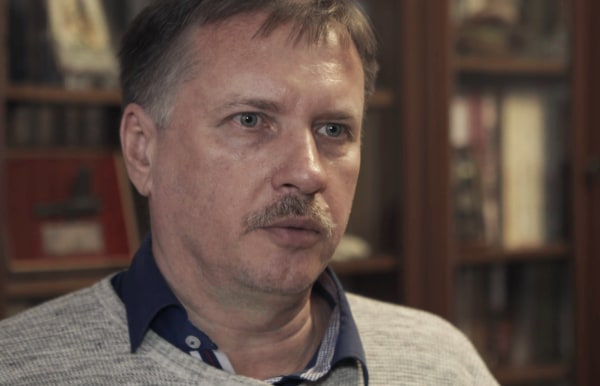 According to Chornovil, Manafort’s campaign tactics that year also included mandating that Yanukovych surrogates wear make-up and Hugo Boss suits during TV interviews. After their TV appearances, they had to return the rented suits to party headquarters, Chornovil said.
According to Chornovil, Manafort’s campaign tactics that year also included mandating that Yanukovych surrogates wear make-up and Hugo Boss suits during TV interviews. After their TV appearances, they had to return the rented suits to party headquarters, Chornovil said.
When Chornovil complained about Manafort to a close associate of Yanukovych, Chornovil said the man told him Manafort was untouchable — “a big cheese here, in charge of everything.”
Manafort was also trying to help Yanukovych expand his base of support.
Ukraine has a sharp political and geographic divide between its pro-Western, Ukrainian-speaking majority and a large Russian minority that looks East.
While other American consultants, both Democratic and Republican, were working on the campaigns of Ukraine’s pro-Western “Orange” parties, Manafort was working for a party whose base was in Russian-speaking Eastern Ukraine. Manafort’s new bosses were oligarchs friendly to Moscow, and hostile to America’s principal military alliance, NATO.
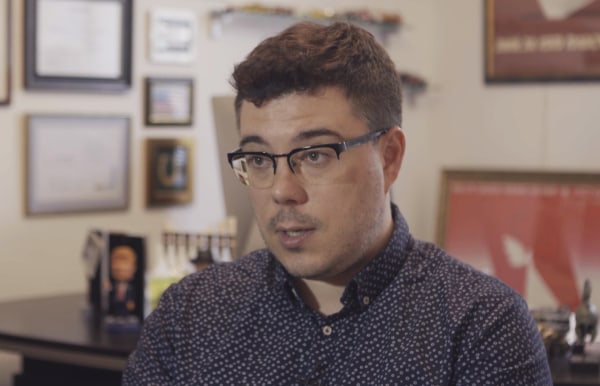 Said Herbst, “They were pro-Russian because that’s where their voters were politically and culturally. So they would not have gotten them if they were arguing for NATO — let’s join NATO — policies.”
Said Herbst, “They were pro-Russian because that’s where their voters were politically and culturally. So they would not have gotten them if they were arguing for NATO — let’s join NATO — policies.”
Skepticism about NATO had the virtue of appealing to many Ukrainian speakers as well. Nationwide, more than half of the public opposed joining the military alliance.
He could attract pro-Western Ukrainians, meanwhile, by broadcasting his support for European Union membership. Some oligarchs behind the party were eager to do business with Europe anyway.
Bill Taylor, who was U.S. ambassador to Ukraine from 2006 to 2009, said Manafort would contact the U.S. embassy and tell them he was urging his client to look West. “[He said] he’d tell Yanukovych, ‘You’ll do better in Western Ukraine if you orient more toward Europe,” recalled Taylor. “‘To broaden your base, you should orient toward the EU.'”
For the next eight years, Yanukovych would adjust his positions on NATO and the EU as needed, tacking East or West depending on the electoral winds and his audience.
Sometimes his party’s public actions and Yanukovych’s private assurances to Western officials were at odds.
“[Yanukovych] was willing to allow all kinds of cooperation with NATO,” which the Russians did not like, said Amb. Herbst, “but it’s true that [Yanukovych] was organizing rallies against NATO exercises.”
Ukrainian parliament votes to have president tried 0:28
autoplay autoplay
State Department cables show that soon after the Party of Regions helped stoke anti-NATO proteststhat spurred an attack on U.S. marines in Crimea, Yanukovych told the U.S. ambassador he wanted Ukraine to join the military alliance.
Through a spokesman, Manafort says his role with Yanukovych and the POR was “strategist and consultant.” Manafort recommended “strategy and messaging,” he said, “especially as it related to the campaign and fulfillment of campaign promises.” The party’s political campaigns, said the spokesman, were “built on a foundation of economic recovery and building a relationship with the West that supported and focused on Ukraine being a part of the European Union.”
Critics of Manafort, however, insist his gameplan for the 2006 election was to drive a wedge into the electorate. Chornovil, Serhiy Leshchenko, a Ukrainian lawmaker and former investigative journalist, and Taras Berezovets, who advised one of Yanukovych’s main political foes, all say Manafort’s strategy was based on polarizing the voting public. They say he wanted to set Russian speakers against Ukrainian speakers, and supporters of Moscow against supporters of NATO.
According to Berezovets, “His idea was to [use] the matter of language to divide the electorate. The whole idea, it really worked.”
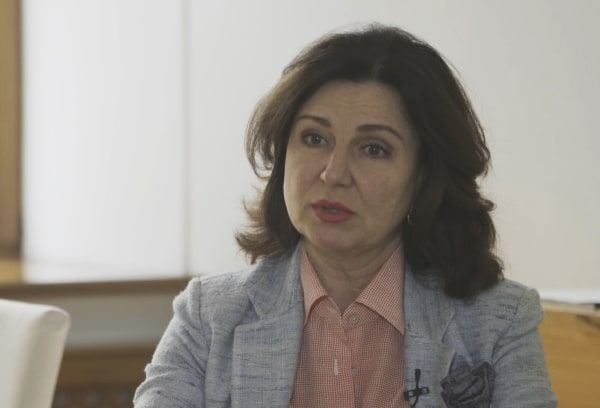 Along with advocacy of making Russian the second, official state language, Manafort pushed “anti-NATO propaganda,” said Chornovil.
Along with advocacy of making Russian the second, official state language, Manafort pushed “anti-NATO propaganda,” said Chornovil.
Berezovets called anti-NATO rhetoric “one of the key ideas of Paul Manafort.”
A former U.S. diplomat in the region said he doubted using wedge issues like NATO was Manafort’s idea, but said, “Manafort was not above telling Yanukovych to exploit wedge issues.” He also acknowledged it could seem odd for a U.S. citizen to be advising an anti-NATO candidate: “I think he probably distinguishes his personal values from his political advice.”
Through his spokesman, Manafort said he never had anything to do with any anti-NATO rhetoric. “Mr. Manafort encouraged the POR to move towards the West and NATO.”
The Party of Regions won the parliamentary elections in 2006, making Yanukovych prime minister again.
‘I Am Trying to Play a Constructive Role’
Yanukovych had to run for prime minister again in 2007. Accusations of corruption and links to the Putin regime were damaging his client’s prospects, so Manafort went back to work grooming his image.
Responding to criticism that he was simply repackaging a flawed candidate, Manafort told the New York Times at the time, “I am not here just for the election…I am trying to play a constructive role in developing a democracy. I am helping to build a political party.”
Manafort hired the American public relations firm Edelman to boost Yanukovych’s public image in Europe and the U.S. for a monthly retainer of $35,000.
Yanukovych, meanwhile, traveled to Germany as part of a bid for European Union membership. “In public and private statements both at home and abroad,” said another leaked cable, “Yanukovych consistently reiterates his government’s commitment to Europe.”
Yanukovych lost the 2007 race. After the loss, both he and his party tacked East with overt anti-NATO rhetoric, a response to Yushchenko’s push for Ukraine to join NATO.
 From January through April 2008, the Party of Regions mounted a slick, well-coordinated campaign against Ukraine’s NATO membership. The “NATO No” slogan appeared on giant television screens and mass-produced blue signs at rallies where Yanukovych spoke. The same slogan was emblazoned on blue and yellow signs carried by the party’s members of Parliament onto the floor of the Parliament in February.
From January through April 2008, the Party of Regions mounted a slick, well-coordinated campaign against Ukraine’s NATO membership. The “NATO No” slogan appeared on giant television screens and mass-produced blue signs at rallies where Yanukovych spoke. The same slogan was emblazoned on blue and yellow signs carried by the party’s members of Parliament onto the floor of the Parliament in February.
Provided with examples of the messaging, Manafort’s spokesman declined to comment.
In 2010, Yanukovych ran for president again, and Manafort again worked for him. This time, Yanukovych pledged to end Ukraine’s NATO bid. Ukraine should not be a member of any military bloc, he said, because “this is the view of the Ukrainian people.” During a meeting with the U.S. ambassador, he said he wanted to “improve cooperation with the U.S. and NATO, but was also interested in “restoring” relations with Russia.
He was elected president, and this time turned East for good.
“Either Manafort was wrong about his guy, or he just didn’t care,” said Dan Fried, a former assistant secretary of state for the region under George W. Bush and Obama. “I think Manafort would’ve preferred his guy be the guy he said he was, but he was okay if he wasn’t. He was doing a job for a client. That’s it.”
A year into Yanukovych’s presidency, his administration prosecuted his chief political rival, former “Orange” Prime Minister Yulia Tymoshenko, for allegedly abusing her position during her time in office. She was sentenced to seven years in prison. Many international observers condemned the prosecution as politically motivated.
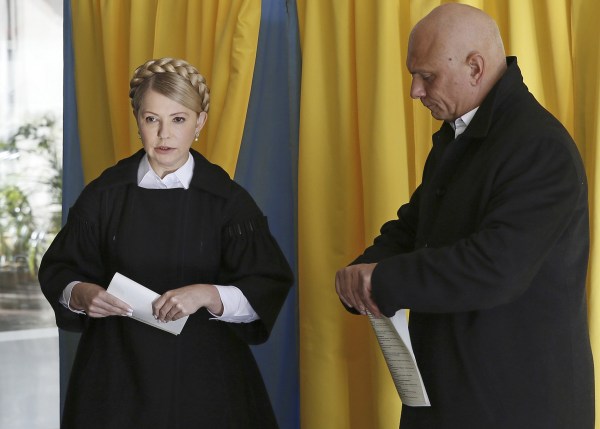 Manafort again looked to the U.S. to burnish his client’s image, and dispel charges that Yanukovych was a corrupt, pro-Putin autocrat. He arranged for Yanukovych’s administration to hire the law firm Skadden Arps to do a legal review of the prosecution. The resulting brief pointed out some serious procedural flaws, but was largely approving of the Ukrainian court.
Manafort again looked to the U.S. to burnish his client’s image, and dispel charges that Yanukovych was a corrupt, pro-Putin autocrat. He arranged for Yanukovych’s administration to hire the law firm Skadden Arps to do a legal review of the prosecution. The resulting brief pointed out some serious procedural flaws, but was largely approving of the Ukrainian court.
Around the same time, however, the Yanukovych administration began to strengthen its ties to the Putin regime and to further Russify the Party of Regions.
According to Inna Bohoslovska, who was a Party of Regions-aligned member of parliament at the time, starting in 2012, “[Ethnically] Russian candidates were placed in all the strong positions. Ministry of Defense, Ministry of Security Service.”
Yanukovych then reversed his position on integrating Ukraine with Europe. Ukraine was about to sign an EU association agreement, making its turn away from Russia and towards the West official, when Yanukovych backed out a week before an official signing ceremony.
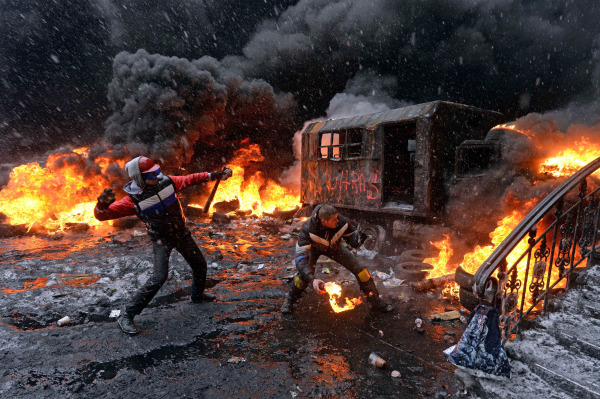 Said Fried, “[Yanukovych] broke more than a campaign promise, he broke his compact with the Ukrainian people.”
Said Fried, “[Yanukovych] broke more than a campaign promise, he broke his compact with the Ukrainian people.”
Yanukovych’s popularity plummeted. His EU decision ignited massive demonstrations in the streets of Kiev, with some crowds as big as 1 million. Ukrainian police cracked down on protestors, and both police and protestors were killed in street violence that took at least 100 lives.
After three months of demonstrations, Yanukovych was ousted as president in February 2014. He fled to Russia. Activists broke into Mezhyhirya, his ornate presidential palace, and were outraged by its gold-plated opulence. “[Manafort] knew that the president’s salary was not enough for the luxury of the Mezhyhirya, so he should have been aware that it was anything but legal money,” said a top Ukrainian anti-corruption investigator.
Russian troops invaded Crimea shortly afterwards, citing Ukrainian unrest and Yanukovych’s ouster as justifications. Russia has now annexed Crimea.
Manafort’s allies have said that Yanukovych stopped listening to Manafort after he became president in 2010, and that Manafort warned him of the consequences of actions like prosecuting Tymoshenko. Manafort’s spokesman said Manafort “was not involved in any of the actions taken in the street riots and opposed the use of force.”
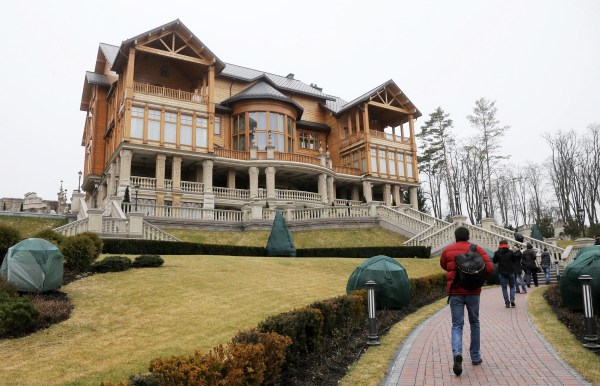 “If you’re going to work for someone like Yanukovych,” said Fried, “there’s a time to jump ship, and that’s when he starts shooting people.”
“If you’re going to work for someone like Yanukovych,” said Fried, “there’s a time to jump ship, and that’s when he starts shooting people.”
Manafort returned to Ukraine after Yanukovych fled the country. He tried, with limited success, to help remnants of the Party of Regions regain power in the October 2014 parliamentary elections.
Yanukovych remains in Russia. He has been sanctioned by the EU and the U.S. for the Crimea invasion, and is wanted by Ukraine for a long list of charges that have included corruption and murder.
“Yanukovych was so awful,” said Fried. “That’s not Manafort’s fault, but the fact that Manafort helped Yanukovych win an election didn’t do Ukraine any good.”
Who Paid The Bills?
Manafort says the 2014 election was his last in Ukraine, and he is done with Ukrainian politics.
But he is now facing questions from Congress and federal investigators about how he was paid for his political work, what he did with the money he earned, and what other business relationships he developed while in Ukraine.
A Party of Regions accounting book, dubbed the “black ledger” and obtained in August by Ukraine’s National Anti-Corruption Bureau (NABU), allegedly shows that Manafort was paid $12.7 million in cash by the party between Nov. 2007 and Oct. 2012.
The ledger records what Ukrainian investigators say were off-the-books payments by the Party of Regions to election officials, party functionaries, and members of parliament. Manafort appears as an intended recipient in the ledger 22 times from 2007 until 2012, according to the NABU. The Bureau notes that the entries are not themselves proof that the payments were made.
In March, journalist Serhiy Leshchenko made waves when he said he had obtained an invoice on Manafort company letterhead detailing how Manafort received money from a shell company in Belize for the alleged sale of 500 computers.
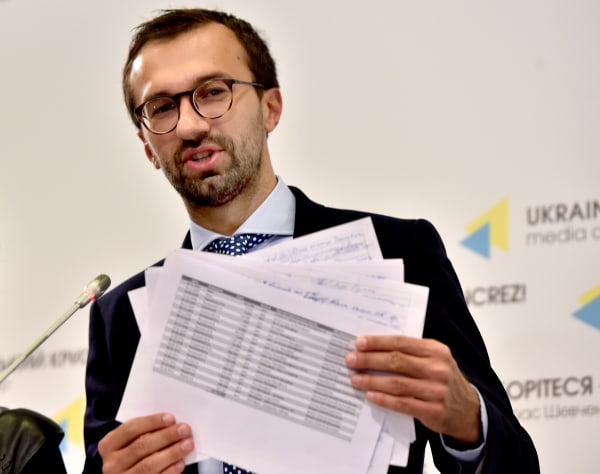 The date on the invoice and the amount of money match an entry in the black ledger marked “Manafort.” Manafort’s spokesman dismissed the invoice and letterhead as fabricated. The shell company, Neocom Systems Ltd., was registered with Belize’s International Business Company Registry, but the principal of the firm that registered the shell company told NBC News he had only dealt with its lawyers, and couldn’t provide any information about its owners. It was struck from the registry in 2011 and dissolved in 2014, according to the Belizean registry.
The date on the invoice and the amount of money match an entry in the black ledger marked “Manafort.” Manafort’s spokesman dismissed the invoice and letterhead as fabricated. The shell company, Neocom Systems Ltd., was registered with Belize’s International Business Company Registry, but the principal of the firm that registered the shell company told NBC News he had only dealt with its lawyers, and couldn’t provide any information about its owners. It was struck from the registry in 2011 and dissolved in 2014, according to the Belizean registry.
Manafort has described the ledger as a forgery. He says any payments he received from Ukraine were legitimate compensation for his work as a consultant, and the payments were lawfully wired to him.
Manafort’s spokesman told NBC News that Manafort “has no knowledge of any payment ledger. Mr. Manafort was only paid via wire — not cash — through U.S. institutions, typically using clients’ preferred financial institutions and instructions.”
The spokesman said Manafort declined to answer whether he had reported to the U.S. government all money and income received from Ukraine.
Ukrainian investigators told NBC News they are now looking into Manafort’s role in the Skadden deal, but say Manafort is not a suspect in any of their investigations.
Manafort also did business with several Ukrainian and Russian oligarchs.
In 2008, Manafort and his real estate partners courted a Ukrainian oligarch named Dmytro Firtash, a major Party of Regions backer, in an $850 million plan to redevelop a famous New York hotel, the Drake. The plan never bore fruit.
Fugitive Ukrainian president vows to fight 6:08
autoplay autoplay
Firtash, who acknowledged to the U.S. ambassador that he got his start in business with the permission of a Russian crime lord, according to a leaked cable, is under federal indictment in the Northern District of Illinois for bribery. He is under arrest in Austria pending his extradition to the U.S.
In 2007, Manafort went into business with Russian billionaire Oleg Deripaska to invest in Ukrainian and European assets. Manafort’s partner Rick Gates “regularly visited” the Moscow offices of Deripaska’s representatives to discuss the investments, according to a later lawsuit.
In 2007 and 2008, companies controlled by Deripaska paid $26.25 million in investment capital and management fees to Manafort and his partners for a deal to buy a cable television company in Ukraine, according to a U.S. court filing. According to Manafort’s spokesman, all the capital was paid to the seller of the company, but Deripaska’s legal representatives alleged the investment was never actually made.
By 2014, Manafort and Deripaska had fallen out over the cable deal, which never materialized.
What did Manafort do with his Ukrainian millions?
He was associated with at least 15 bank accounts and 10 companies on Cyprus, dating back to 2007, according to two banking sources with direct knowledge.
Related: Manafort-Linked Accounts on Cyprus Raised Red Flags
The sources told NBC News’ Richard Engel that after certain transactions raised concern, the bank began investigating the accounts for possible money-laundering. Manafort closed some of the accounts in 2012.
A spokesman for Manafort told NBC News that all the accounts were set up at the direction of clients in Cyprus, a common banking center for Russians and Ukrainians, “for a legitimate business purpose.”
As NBC News and others previously reported, Manafort also bought four properties in New York City between 2006 and 2013, apparently for cash, and then took out more than $15 million in loans on them between 2015 and 2017.
Related: Ex-Trump Aide Manafort Bought New York Homes With Cash
A source familiar with the matter said New York Attorney General Eric Schneiderman is taking “a preliminary look” at Manafort’s real estate transactions.
Putin on Ukraine: ‘This is an Unconstitutional Coup’ 2:39
autoplay autoplay
Manafort said his transactions were “executed in a transparent fashion and my identity was disclosed — in fact my name is right there on the documents.”
In September 2016, NBC News has reported Manafort took out a mortgage on his home in Bridgehampton, New York, but no mortgage notice was ever filed and no mortgage tax paid, according to Suffolk County records. His name did not appear on any publicly available documents.
Related: Feds Subpoena Records for $3.5 Million Mystery Mortgage on Manafort Home
A spokesperson for Manafort said the mortgage was a bridge loan and was paid off by December. Manafort’s lawyer said the mortgage paperwork was rejected because of an error and was never refiled.
Federal investigators have now subpoenaed records related to that loan.
